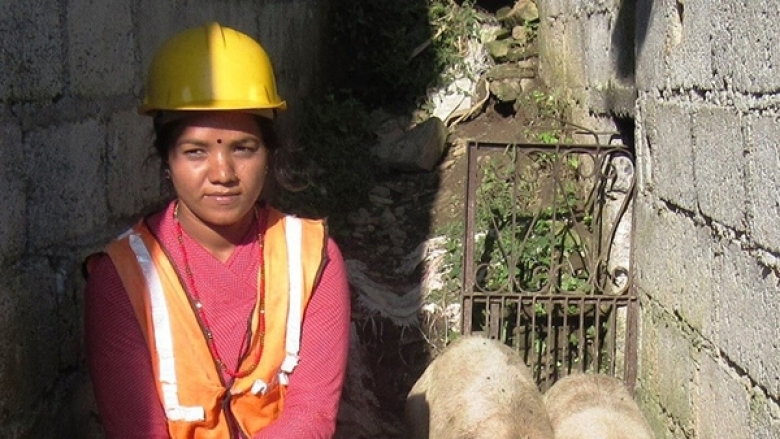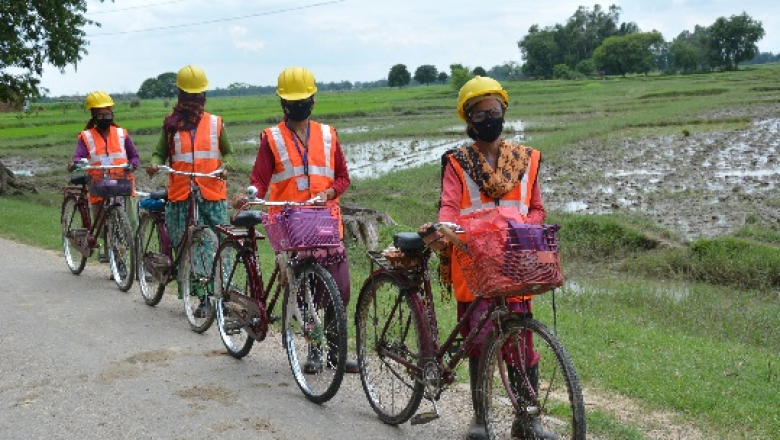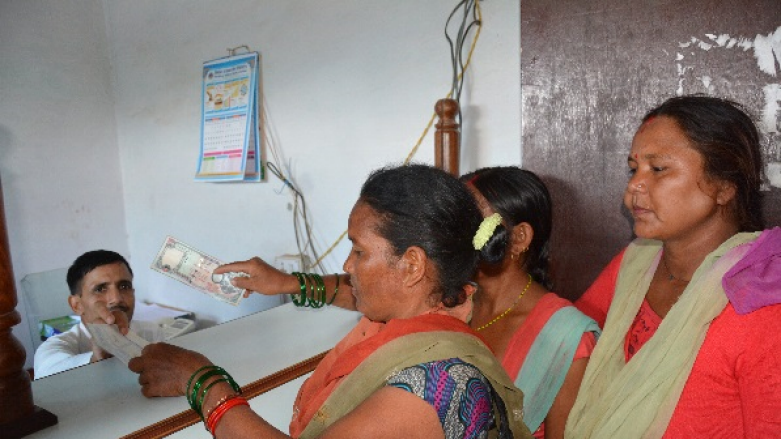Approach
The project aims to enhance availability and reliability of transport connectivity for rural communities in 36 participating districts by adopting a “maintenance first" approach in rural roads for the first time in the government’s system. Prior to implementation of SNRTP in 2013, there was no provision of routine maintenance for rural roads and crossing structures. , including HIV-positive and differently-abled individuals, residing close to the road segments.
; capacity building trainings; credit linkages to cooperatives for income generating activities; facilities of loans and flexible repayment schedule; skills development and income generation trainings; and practical trainings on environmental protection and bioengineering. These efforts have contributed to strengthening financiThe project surpassed the originally set maintenance target of 3,067 km of roads as reported in September 2015 implementation review. The additional work of routine maintenance is ongoing on 5,500 km of roads and it emerged as one of the largest employment generating program under the Executing Agency (Department of Local Infrastructure) by creating 2.5 million workdays of paid employment for rural workers.
The project’s efforts have led to mainstreaming the Gender Equality and Social Inclusion approach during recruitment of Road Maintenance Group (RMG). Under this approach, the Government of Nepal has developed and implemented the Road Maintenance Guideline (2016), which mandates employment generation opportunities for the poorest and marginalized people within the zone of influence, with preference to female candidates and an all-women maintenance work force where feasible. The project has been successfully recruiting over 70% women workers as RMG, 34% Dalit (socially underprivileged), 35% minority ethnic groups. Overall, 100% of the selected RMGs belong to marginalized and vulnerable groups.
Road maintenance workers on their way to work The project prompted occupational safety and health (OSH) requirements for the first time in Nepal's rural asset maintenance. It has also developed OSH guidelines which includes safety plans and penalty clauses with special provisions to ensure appropriate age, health, security, recordkeeping and working conditions for the RMGs. These provisions have been included in the standard contractikng document which is applicable to all labor employed under the project.
Due to the success of project’s collaboration with ILO, the project has created jobs and safe and decent working conditions for rural workers while targeting recruitment of 100 percent female participation in the labor force.
The system is encouraging transparency, reducing fiduciary risks, fostering good governance, and improving service delivery. The bank is additionally providing them with training on financial literacy, credit linkage, and supporting them with livelihood enhancement programs.
s, 49% (1,407) saved less than $490 (NRs 50,000). 68% (1,780) of RMGs were linked with local cooperatives to generate alternative income with support from their family members. 13% (373) renovated their earthquake affected houses. 34% (976) of RMGs constructed and connected toilet with bio-gas, which created positive impact on their health, hygiene and environment for 2,872 families. 45% (1,292) were able to send their children into private schools.
Road maintenance workers collecting their wages at a local Bank In addition, 70% of RMGs and their family members started animal husbandry, poultry farming, off seasonal vegetable cultivation, retail and tailor shops, with their savings and credit facilities from banks. Due to various skills and capacity building trainings combined with exposure to financial literacy, these RMGs have developed negotiation and leadership skills. With their new found confidence and skills, a bfew of them participated in a local election held on May 14, 2017, and four of them won as ward level member and transformed themselves from road makers to decision makers.
Bank Group Contribution
The project’s total cost is $175.4 million with an IDA contribution of $100 million consisting of of $72 million in grants and $28 million as credits. For the maintenance component, the total allocated fund is $50 million of which 2% of the total cost is being met through IDA contribution and the remaining 98% is borne by the government.
Partners
The Bank has been successfully collaborating with the Ministry of Federal Affairs and General Administration (MoFAGA), Government of Nepal (GoN), UN agency- International Labor Organization (ILO), and the private sector (Mega Bank) for implementation.
Moving Forward
- The capacity of the implementing agency has been strengthened through achievement of knowledge building, strengthening of systems, and standardizing mechanisms. This includes establishing dedicated section, development of required policies and guidelines, Information and Communication Technology based Rural Transport Management System, IT-based Grievance Redress Mechanism, and Project Appraisal Tool standardizing the entire approach. These tools are substantially helping the organization with its implementation and monitoring capabilities.
- Introduction of the “maintenance first” approach in rural roads in the Government’s system is now being replicated by other local government units (municipalities) where part of their annual budget is dedicated for rural road maintenance (e.g., Palpa, one of the mountain districts in western Nepal).
- Yet, in the wake of the recent transition towards Federalism, most of these functions are now envisaged to be devolved to the Provincial Governments. Accordingly, transcending these best practices and skills to these new implementation entities, beyond the Project period, continues to be a major challenge as well as opportunity.




